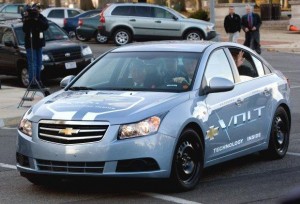By Elli Bell, Michigan Energy Program Intern
Choosing a new car is always exciting, but sometimes picking a car with all the “right” specs for your lifestyle is a total headache. Often it seems impossible to make the right decision, or even to dig through all the advertising to get to the actual details of your future car. There are all the technical things to consider like horsepower, reliability and repair costs. Then there are the fun things like color, how many gadgets you want, interior paneling, and leather or fabric seats.
But perhaps the most important consideration, the one that affects us every day no matter how car savvy we are, is fuel efficiency.
The sinking feeling in the pit of your stomach as your car gets closer and closer to E, while the price at the gas station keeps getting higher and higher is one of those things we could all go without. Though the price of gas has now stabilized at just under $4 a gallon, the high prices have left us extra conscious of our cars’ gas mileage. Now, manufacturers are reflecting this shift by producing smaller, more efficient cars like the Ford Fiesta, and the Chevrolet Spark and Chevrolet Sonic.
To encourage these efforts and reduce greenhouse gas emissions, the Environmental Protection Agency recently issued a new fuel efficiency standard that requires all automobiles to average 54.5 MPG by 2025. This standard will save consumers money at the pump and protect the environment by eliminating an estimated 6 billion tons of harmful motor vehicle emissions, which currently account for 17% of our total greenhouse emissions. The new mandate nearly doubles existing efficiency standards, a huge victory for clean air and price conscious consumers alike. It is estimated that by 2025, consumers will see fuel savings of about $8000 per vehicle.
Not only does this EPA regulation encourage car manufacturers to continue producing smaller, lighter, more efficient vehicles, but it also gives them an incentive to continue investment in electric and hybrid technologies. Many manufacturers are developing their first generations of electric vehicles, the most popular being the Chevy Volt, the Toyota Prius, and the Nissan Leaf.
This mandate will encourage the automotive industry to continue to pursue these technologies and has been endorsed by 13 major automotive companies, including GM, Chrysler, and Ford. As Michigan companies stay on the frontier of developing these revolutionary technologies, they bring important and exciting jobs to our state.
So, as you shop for your next car, consider supporting the “Big Three” and Michigan technology as they lead the industry with their range of hybrid and electric vehicles.
I encourage you to voice your support of the EPA fuel standard, to your representatives and senator and visit, LIKE, and share Built by Michigan on Facebook to spread the word about the leadership Michigan industry is taking in protecting the environment and developing new technology.



